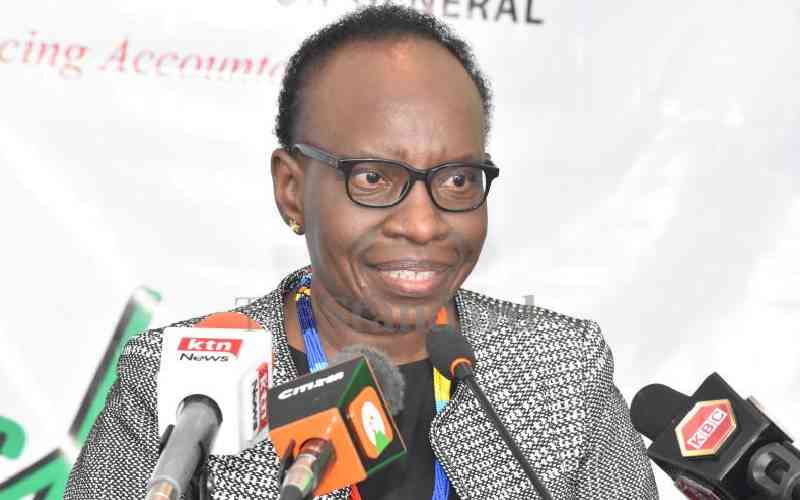Prof Chris Wanjala’s article - Can intellectuals be men and women of God? - in The Standard on Saturday’s June 4, 2016 issue was timely.
The good professor blamed “moral laxity” and run away corruption on our universities’ failure to recognise God’s domineering presence in everything human beings do. Indeed, he proposed that religion should be taught as a common unit to all university students irrespective of their discipline to help contain the fast draining of morals. He challenged his peers in the academy to invoke God’s name and His virtues in their lecture halls.
Interestingly, Prof Wanjala’s counsel comes only a few months after President Uhuru Kenyatta gave an indictment on our morals. In an address in Kiswahili to Kenyans living in Israel on February 24 during his state visit to that country, President Kenyatta decried Kenyans’ base morals: “Kenyans are experienced in stealing and perpetuating other crimes.”
But then the President was also hopeful that all was not lost, saying Kenya was “20 times more wonderful than Israel.”
Yet, it is not only the President and Prof Wanjala who care that the country’s morals are being drained.
Early in the year, former Chief Justice Willy Mutunga lashed out at our morals too. In an interview with a Dutch Newspaper, NRC Handelsblad, Dr Willy Mutunga deprecated our national morals in a more incisive and reprimanding way. He said the country was rotten from bottom to top in the proportions of Al Capone’s mob of the America of the 1920s.
The Chief Justice deductively placed the blame at the feet of “mafia-style cartels run by political bosses and corrupt business people.” He gave a bleak picture of the country which he said had become a “bandit economy”.
Prof Wanjala’s article not only identifies the problem — compromised morals — but goes further to offer a solution: incorporating religion in university training. Several questions came to mind after reading the article: Can university dons claim a high moral ground to midwife this long overdue drive? Can professors influence the necessary change in the entire nation without compromising other core businesses of the university such as research and teaching?
Are there any comparative studies on the impact of religion as a discipline on students who study it in schools and universities? Lastly, have the churches failed despite their heavy presence in almost every village, suburb, town and city?
Since it is apparent that the whole Kenyan society is rotten, and having carefully considered Wanjala’s view, I am bound to concur with him. But what is the cause of these deviant moral beheviours among Kenyans?
I think the urge for primitive accumulation or “ursprungliche akkumulation” as Karl Marx called it, is where the rains began pounding the country. Marx was referring to the period from which capitalist accumulation was rooted: it was simple, crude and rough capitalism without the human face to it, what Mwalimu Jullius Nyerere said was a man-eat-man society ideology.
Marx, in my view, was right when he tried to understand society in terms of the base and the superstructure.
He posits that the base or the economic structure influences the superstructure including morals. Some literary creative writers have demonstrated how the economic base has created strained social classes in society, with the rich fleecing the poor in multiple ways, making the latter hopeless and dehumanised.
Bertrand Russel approves of Marx’s standpoint when the former avers that every living thing is a sort of imperialist, seeking to transform the envronment as much as possible into itself. This could explain the thieving nature of our countrymen and women cutting across and up all cadres of our nation-state. A civil servant picks a bribe here and there, a vegetable vendor bribes a town council official, a judge compromises his ethics, a business person colludes to milk the country dry, a university don compromises standards, his student cheats in the examination, a pastor fornicates, the list is endless.
So, who should rescue who?
Stay informed. Subscribe to our newsletter
I submit that there should be a national dialogue. This dialogue must redefine succcess and put mechanisms in place to de-emphasise primitive wealth accumulation as the ordained route to success. Indeed, the problem with Kenyans is not the laws, never ever the constitution. It is the morals.
To understand the importance of morals in a country such as ours, we need to appreciate what it means elsewhere. A Tanzanian will instantly plead guilty to a charge in which he borrowed money from a friend in the absence of witnesses and agreements in writing and has failed to pay back. But an immoral Kenyan in similar circumstances will deny even ever seeing or knowing the lender, making the case drag on and a judge finally setting the mischievous borrower free.
It is disappointing that not even the clergy can lay claim to moral high ground. Their desire for money has compromised the traditional role of providing food for soul. Thieves find comfort in churches giving handouts with the clergy praising them. Although the bible allows giving of alms, some preachers have made it the central purpose of their summons by demanding higher denominations. This gives an impression of the church on sale. That way, the country will continue to go down in the abyss.
Prof Wanjala’s article was spot on with regard to hybridisation of the Western and African traditional cultures and religion to help shape our morals. It is pointless to regret that the African culture was destroyed by colonialism. Since culture is as dynamic as human character, it (culture) would have changed even without colonial experience. The best we can do about it now is select the best that was left in the “wreckage” and blend it with the best we got from European and move on.
Kenya is a religious country. True. But the effect of religion in people’s lives is missing. What we see are endless lists of economic scandals everywhere. No one appears clean. Not the clergy, not the university don. But there is hope. The university professor must dialogue within himself before dialoguing with his student.
Our teachers, the Kenya National Examinations Council (Knec), the police, the ministry and all stakeholders must dialogue within themselves before they reach out to the students. As a country, we must all take common positions on the evils committed instead of reading politics in everything.
A suspect of economic crime must be viewed so by all without inducing politics into it. That approach will salvage the little that remains of this country. A snowballing approach in all sectors of our economy could help.
Dr Remmy Shiundu teaches literature at Pwani University, Kilifi.
 The Standard Group Plc is a
multi-media organization with investments in media platforms spanning newspaper
print operations, television, radio broadcasting, digital and online services. The
Standard Group is recognized as a leading multi-media house in Kenya with a key
influence in matters of national and international interest.
The Standard Group Plc is a
multi-media organization with investments in media platforms spanning newspaper
print operations, television, radio broadcasting, digital and online services. The
Standard Group is recognized as a leading multi-media house in Kenya with a key
influence in matters of national and international interest.
 The Standard Group Plc is a
multi-media organization with investments in media platforms spanning newspaper
print operations, television, radio broadcasting, digital and online services. The
Standard Group is recognized as a leading multi-media house in Kenya with a key
influence in matters of national and international interest.
The Standard Group Plc is a
multi-media organization with investments in media platforms spanning newspaper
print operations, television, radio broadcasting, digital and online services. The
Standard Group is recognized as a leading multi-media house in Kenya with a key
influence in matters of national and international interest.








